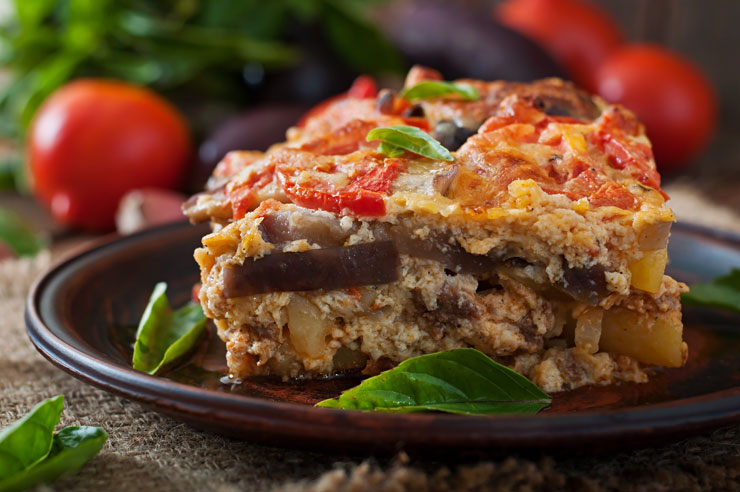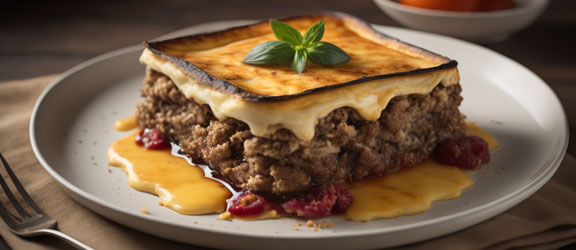Moussaka
Story
Greek cuisine is not complete without moussaka, which has origins in ancient cultures. The idea of stacking components was first established throughout the Middle Ages, and Arab influences may be traced back to this period. The term “moussaka” originates from the Arabic word “musaqqaʿa,” which signifies “chilled.”
Over several years, the dish underwent changes, and its current form was established in the early 1900s. The contemporary Greek moussaka is commonly ascribed to Greek chef Nikolaos Tselementes. Using traditional Greek ingredients like eggplant and lamb and French cooking skills as inspiration, Tselementes created the béchamel sauce topping in the 1920s.
The layers of eggplant, minced beef, and béchamel that make up moussaka are a result of the blending of Eastern Mediterranean, Balkan, and Western European culinary traditions. Even now, it is still a cherished dish that represents the lengthy and varied history of Greek cuisine.
Nutritional Information
A standard serving of moussaka, which weighs around 300 grams, has the following nutritional values. Please be aware that these figures may change depending on the particular recipes and products utilized.
| Calories | 350-400 kcal |
| Protein | 18-22 grams |
| Fat | 22-28 grams |
| Carbohydrates | 20-25 grams |
| Cholesterol | 60-80 mg |
| Sodium | 600-800 mg |
| Vitamin A | 10-15% of the Daily Value (DV) |
| Vitamin C | 10-15% of the DV |
| Calcium | 15-20% of the DV |
| Iron | 10-15% of the DV |
Because of its balanced protein, fat, and carbohydrate content, moussaka is a satisfying and substantial dish. But as part of a balanced diet, it is best consumed in moderation because of its relatively high fat and salt content.
Moussaka
Cuisine: GreekDifficulty: Medium8
servings45
minutes1
hour30
minutes450
kcalGreek classic moussaka is a meal that combines minced beef, eggplant, and a flavorful béchamel sauce. Perfectly baked, it perfectly captures the aromas of the Mediterranean, combining rich meat sauce with earthy eggplant. It’s a filling dish that tastes great when served hot and perfectly captures the colorful culinary legacy of Greece in each mouthful.
Ingredients
Eggplant
Ground meat (usually lamb or beef)
Onion
Garlic
Tomatoes (fresh or canned)
Olive oil
Potatoes (optional)
Béchamel sauce (made from butter, flour, milk, and eggs)
Spices such as cinnamon, nutmeg, oregano, and salt
Cheese (typically Parmesan or Kefalotyri)
Bread crumbs (for topping, optional)
Directions
- Prepare the Eggplant: To prepare the eggplant, slice it, sprinkle it with salt, and let it for a while to remove any extra moisture. Clean and pat dry before preparing food.
- Cook the Eggplant: Slices of eggplant should be baked or fried until they are tender and golden brown. Put aside.
- Prepare the Meat Sauce: Cook minced beef until browned by adding onions, garlic, and tomatoes. Add seasonings such as oregano and cinnamon.
- Prepare the Béchamel Sauce: To make a thick sauce, make a roux using butter and flour and then gradually add milk. Add eggs to the mixture for taste and richness.
- Layer the Moussaka: Layer the cooked eggplant, meat sauce, and béchamel sauce in a baking dish, continuing until the dish is filled.
- Bake: Finally, pour béchamel sauce over the Moussaka and top with cheese and breadcrumbs. Bake till bubbling and golden brown.
- Rest and Serve: Take a few minutes to let the moussaka settle before slicing and serving. Savor the depth of flavor in this traditional Greek meal!
Notes
- Embrace the beauty of layering tastes as you prepare moussaka. Every component of this dish, from the rich, earthy eggplant to the cozy, spiced beef and creamy béchamel, has a distinct personality. As you create a dish that exudes Mediterranean heritage and culinary joy, let patience and passion lead the way. Salutations!

